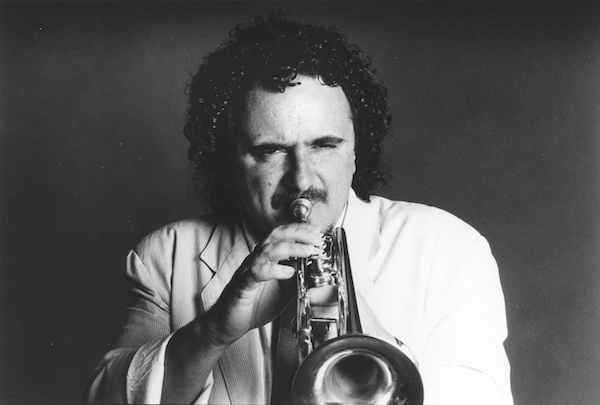Jan 13, 2026 2:09 PM
More Trump-Kennedy Center Cancellations
The fallout from the renaming of the John F. Kennedy Center for the Performing Arts to include President Donald…

Claudio Roditi (1946–2020)
(Photo: David Gahr/DownBeat Archives)Claudio Roditi played trumpet like he was riding the waves that endlessly lapped Ipanema Beach—gliding effortlessly along the contours of his phrases and, in the process, shaping timeless narratives. So it was at an October 2018 performance honoring Resonance Records’ 10-year anniversary at the Manhattan club Birdland.
Yet, for all its easy brilliance, the performance was tempered by an urgency that, in retrospect, revealed Roditi’s time was short. So, too, did the thinness of his usually robust physique. As he confided to pianist Donald Vega that day in the club’s basement, he was suffering from cancer.
“He sounded great, he was smiling,” Vega recalled recently. “It was just straightahead. He probably made a few jokes about it.”
Roditi, who died on Jan. 17 at 73, was like that. “He made sure everybody was happy onstage—everybody,” said drummer Duduka Da Fonseca.
Da Fonseca and Roditi first met in Rio de Janeiro in 1966, when the former was 15 and the latter 20. They grew close, playing bossa nova and bonding over a love of bop and its variants.
In the same year, Roditi entered a jazz competition in Vienna, Austria, where he met trumpeter Art Farmer, who became a mentor. Encouraged to pursue jazz, he enrolled at Boston’s Berklee College of Music in 1970, eventually hooking up with Da Fonseca in New York, where they began to develop their synthesis of musical traditions in earnest.
“He always encouraged me to play the way I play, to mix the essence of samba with the freedom of jazz improvisation,” Da Fonseca said. “And we had the same goal in life: to refine the art form.”
Roditi revisited the synthesis often, each time refining it until the elements became almost indistinguishable. In the mid-1990s, he released Samba Manhattan Style and Jazz Turns Samba; a quarter-century later, Brazilliance X4 (Resonance), featuring Da Fonseca. Nominated for a Grammy, that album’s track list includes an explicit nod to Da Fonseca in “Tema Para Duduka.”
With a laugh, Da Fonseca noted Roditi’s psychoanalytic take on the tricky tune. “‘Duduka’ is a little complex,” he recalled Roditi saying. “That’s because of your personality.”
Roditi was comfortable in an orchestral setting, too, garnering a second Grammy nomination for 1994’s Symphonic Bossa Nova, featuring Ettore Stratta and the Royal Philharmonic. And he was conversant in a range of jazz idioms, especially as practiced by a childhood hero who pioneered the blending of jazz and Latin beats: Dizzy Gillespie, with whom Roditi won a Grammy as part of an ensemble for Live At The Royal Festival Hall.
Roditi’s instrumental capabilities extended to the piccolo trumpet and the flugelhorn, though it was the rotary valve trumpet to which he always returned. For a time, he played the valve trombone, most famously with the Cuban wind player Paquito D’Rivera. Ultimately, he gave it up because its larger mouthpiece was comprising his embouchure, according to trombonist Michael Dease.
“He was an all-time great valve-trombone player,” said Dease, who played in Roditi’s band for more than four years beginning in 2007. “But he didn’t want to sacrifice his trumpet chops.”
Through it all, those chops never wavered. They were heard to excellent effect on his final projects with Da Fonseca: the album Samba Jazz & Tom Jobim (Sunnyside), released in August 2019, on which he renders the opening tune, “Gemini Man,” with a searing but subtle intensity, and as a guest with Da Fonseca’s longtime band Trio da Paz in their annual residency at Dizzy’s Club.
The engagement lasted 12 nights, but Roditi was so sick that he was only able to play nine. On Aug. 29, 2019, Da Fonseca said, Roditi played his last live performance. Tellingly, he offered to repay the drummer for the days he couldn’t work.
“He was one of the most generous men I ever met,” Da Fonseca said. DB

Belá Fleck during an interview with Fredrika Whitfield on CNN.
Jan 13, 2026 2:09 PM
The fallout from the renaming of the John F. Kennedy Center for the Performing Arts to include President Donald…

Peplowski first came to prominence in legacy swing bands, including the final iteration of the Benny Goodman Orchestra, before beginning a solo career in the late 1980s.
Feb 3, 2026 12:10 AM
Ken Peplowski, a clarinetist and tenor saxophonist who straddled the worlds of traditional and modern jazz, died Feb. 2…

The success of Oregon’s first album, 1971’s Music Of Another Present Era, allowed Towner to establish a solo career.
Jan 19, 2026 5:02 PM
Ralph Towner, a guitarist and composer who blended multiple genres, including jazz — and throughout them all remained…

Rico’s Anti-Microbial Instrument Swab
Jan 19, 2026 2:48 PM
With this year’s NAMM Show right around the corner, we can look forward to plenty of new and innovative instruments…

Richie Beirach was particularly renowned for his approach to chromatic harmony, which he used to improvise reharmonizations of originals and standards.
Jan 27, 2026 11:19 AM
Richie Beirach, a pianist and composer who channeled a knowledge of modern classical music into his jazz practice,…